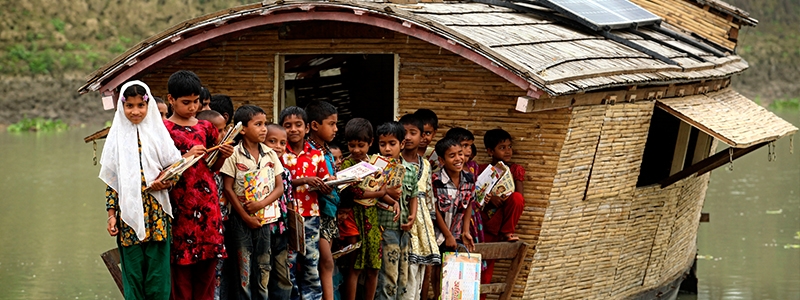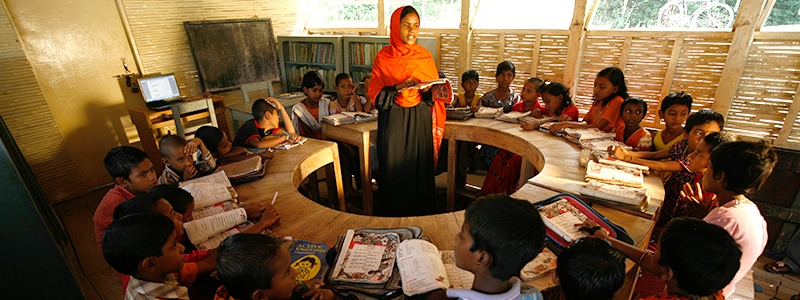Problem: Combating the lack of access to education in monsoon areas that suffer from flooding.
In Bangladesh, a large part of the population lives in rural areas subject to flooding, which makes it difficult for students to get from one place to another. In the region of Chalambeel, in the northeast of the country, where the project has been operating since 2002, more than 40% of the population is considered landless and at least 31.5% live below the poverty line. The majority of people do not have access to electricity, essential information, education or any type of professional training. The principle philosophy of the project was that if children cannot go to school, the school should go to them. The project aims to transform the navigable rivers of the region into pathways for education, information and technology and by doing so, take people out of poverty, promote human rights and protect the environment.

Solutions: The floating school is a combination of school bus and school. The boats pick up the students from isolated riverside villages, dock in a specific place and classes are given to a group of students inside the boat. After class, the boats take the children home and pick up another group.
Each school boat has a classroom for 30 students, a laptop connected to the internet, a library and electronic resources. At least three classes are given per day. The classes are for students of basic education. The solar energy permits the floating schools to offer classes at night for students who work. On some boats, there is a library with up to 1,500 books, between two and four computers with access to the internet, a printer and mobile phones. The use of laptops helps the students learn about new technology, to check e-mails and visit educational sites. Children, adolescents, adults and the elderly, mainly women, learn to use the computers to obtain information about agriculture, biodiversity, climatic alterations, work opportunities, human rights and public services.
The project has a fleet of 54 boats that operate as schools, libraries, health centers and training centers. A central library located in the region has computers connected to the internet, 50,000 books and magazines and a technology center equipped with over one hundred computers. The surplus solar energy generated by the solar panels on the boats is distributed among the families of the region by use of kerosene lamps transformed into rechargeable solar powered lamps. Parents and members of the community also receive training on the boats related to nutrition, health, hygiene, sustainable agriculture, systems of commercialization of products and the cultivation of rice and sugar cane, which are resistant to flooding. Themes such as protection of the environment and water conservation are also introduced.
 Abir Abdullah Shidhulai Swanirvar Sangstha
Abir Abdullah Shidhulai Swanirvar Sangstha
Outcomes: The project has helped students and the community of the regions affected by flooding to have greater access to their rights, and learn about climatic alterations and sustainable agriculture. Parents of the participants experienced an increase in their income. The students who benefited from the project take the knowledge they acquire home with them and help their families to learn how to write their names and count money. The children start to read books at home at night and the parents can carry out manual work with the help of the solar lamps. The initiative has also helped to develop agriculture in the region, improving the supply of food to the families throughout the year, resulting in better nutritional and health conditions of the children.







